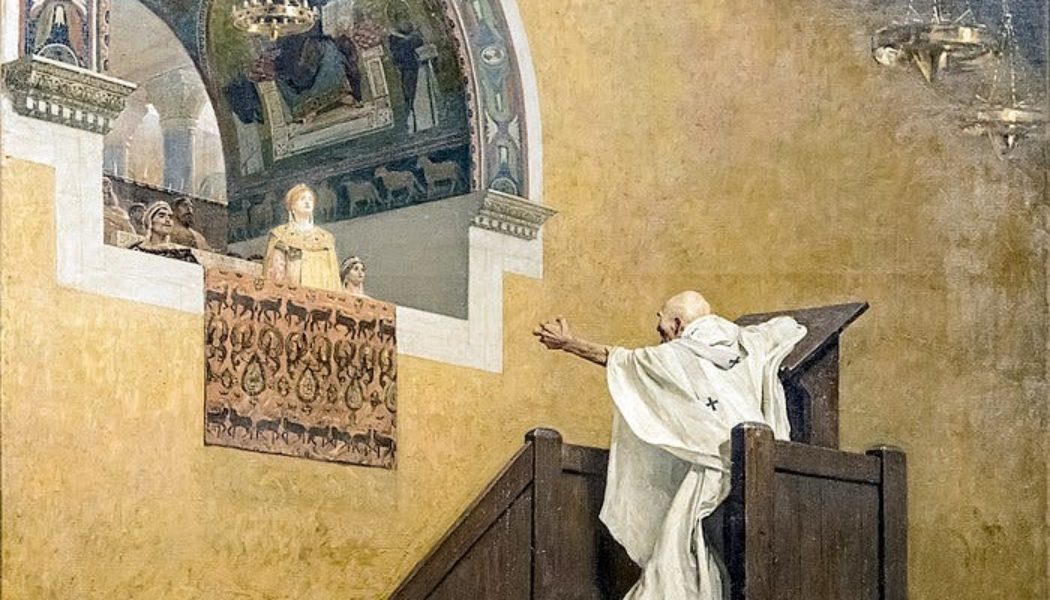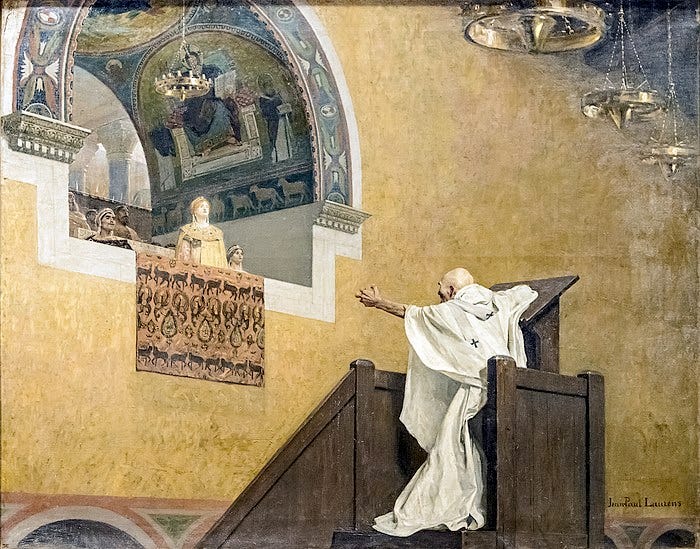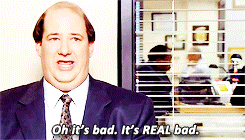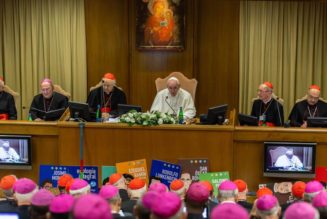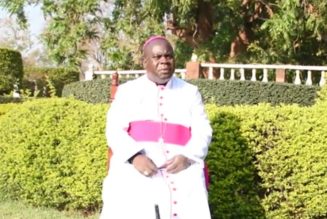Pillar subscribers can listen to Ed read this Pillar Post here: The Pillar TL;DR
Happy Friday friends,
And a very happy feast of St. John Chrysostom (that’s Goldenmouth, to us non-Greek speakers).
St. John is one of those saints whose feast day is a reminder to me about how vast our history is, and how much of it I barely know or understand.
Sure, I have read some of his most famous works, especially when they come up in the Office of Readings. And I can tell you that as Patriarch of Constantinople his famous eloquence as a preacher got him exiled twice from his city and see, dying in Armenia.
And I could even tell you, mostly thanks to a famous painting, that he tangled particularly with the Empress Aelia Eudoxia, who was unusually active in Church affairs for an empress-consort.
But my knowledge of the 1,000 years of Byzantium is barely surface level, and my appreciation of the Eastern Empire’s great saints is equally poor. I need to spend more time reading about both to appreciate them better.
Context, of course, matters — and can change entirely our appreciation of a person.
Case in point, John famously liked Eudoxia to the girl who charmed King Herod, referring to her during one of their feuds while saying “Again Herodias is raging, again she is dancing, again she demands the head of John on a platter.”
She’d had a silver statue or herself installed on a column outside Hagia Sofia, which is bound to get a reaction from any half-decent preacher.
Taken with the image above, it’s easy to form a picture of a man possessed with righteous fury, raging against the decadent narcissism of the empress. And the temptation to fulminate against iniquity is one I know all too well — and it’s all the stronger if you allow yourself to think you’re aping a saint.
But John was also the man who said that “No matter how just your words, you ruin everything when you speak with anger.” That’s not an example I find easy to remember or follow.
So, in the spirit of acknowledging my own ignorance, if anyone has any good recommendations for books on the ecclesiastical history of Byzantium, please leave them in the comments.
Anyway, here’s the news.
The News
The priest who filed suit against the once-prominent media personality, Fr. Thomas Rosica, came forward in an interview with The Pillar this week.
Fr. Michael Bechard of the Diocese of London, Ontario, detailed the sexual assaults he alleges Roscia — who served as an official Vatican spokesman for the 2019 summit on clerical abuse — committed against him.
The priest told us that he hopes his story might encourage other priests harmed in the Church to find healing. As he put it: “I’m not looking to burn anything down. I’m just looking for a sense of accountability within the institution.”
You can read the whole interview here.
—
The Vatican this week announced the permanent merger of two Welsh dioceses previously united in persona episcopi which will now form the new Archdiocese of Cardiff-Menevia.
Archbishop Mark O’Toole called the announcement “joyful news,” which I think might be over-selling things slightly, and said he was “immensely grateful” to Pope Francis for approving the merger, which had been widely expected since O’Toole became bishop of both dioceses in 2022.
“We received this decision more quickly than anticipated, which I believe reflects the confidence the Holy See has in the process we have undertaken,” the bishop said.”
The bishop’s somewhat incredible enthusiasm for the merger to one side, it is certainly the case that the merger is a vote of confidence in plans drawn up locally. And as we have been saying for some years now, similar mergers are coming for dioceses in the United States.
So this is a story worth reading.
—
The USCCB has released its audited financial statements for 2023, shedding light on one of the more contentious national stories of the year so far — the Catholic Campaign for Human Development.
The program, funded by an annual national second collection, awards grants to organizations which seek to reduce poverty through community organizing or action. Its long-time director resigned earlier this year, with reports (from us) soon following of financial turmoil and a budgetary blackhole at the CCHD.
The program became a serious bone of contention at and following the bishops’ June meeting, with the financial fallout of the CCHD’s problems leading to layoffs at the conference.
Now, with the conference’s audited financials out and available, Brendan Hodge took a look at the numbers to figure out what happened at the campaign, and how bad, exactly, its finances were.
—
The Nordic bishops’ conference unveiled its new leadership this week, soon to be led by Bishop Erik Varden of Trondheim and Bishop Raimo Goyarrola of Helsinki, as president and VP respectively, and by Sr. Anna Mirijam Kaschner as general secretary.
Luke pointed out this week — in one of his Look Closer quick-fire analyses which I strongly encourage you to read and enjoy while you can — that the Nordic conference is pretty small by the numbers, but punches way above its weight in terms of intellectual heft.
How’d that happen? Read all about it.
I’d also point out that, for American Catholics of a certain vintage, this story has and interesting angle.
Many will remember the year 2000, when the USCCB asked Rome’s then-Congregation for Bishops if it was possible to install a woman religious — specifically a canon lawyer, Sr. Sharon Euart — as conference general secretary.
The congregation wrote back with a firm “no”, insisting the role had to be filled by a cleric.
Given Sr. Anna Mirijam Kaschner is filling the post for the Nordic conference now, something seems to have changed in the dicastery’s thinking — though I at least missed the announcement when it did.
—
As most of you know, JD has been in Ecuador this week for the International Eucharistic Congress.
Part of the reason he was so eager to go was to compare and contrast the international event with the recent U.S. Eucharistic congress which was such a success this summer. He’ll be filing more on that in the coming days.
But another important reason we like to turn up to events like the IEC is that you never know who you might bump into.
Case in point: this week JD got to have a spontaneous discussion with Dr. Frank Ronge, who for the last several years has been responsible for coordinating der Synodaler Weg, or synodal path, undertaken by the Church in Germany.
As you would hope and expect, JD had a lot of questions for Dr. Ronge about the synodal way and Rome’s attempts to reign it in, and the good doctor was refreshingly forthright in his answers.
Read the whole conversation here.
Of course, as is often the case, some of the most interesting things to be seen are nowhere near the conference hall and don’t feature on the official agenda.
Far outside the city’s central district, in the hills climbing towards Andean peaks in Quito’s poor southwest, a small group of staff and volunteers run Albergue San Juan de Dios, a center for refugees, for families, and for the poor — people who have no place to go, and are looking to come in from the cold of Quito’s night air.
JD went to see the hospitality they offer, and meet the people who offer it.
—
Two ongoing stories we have been reporting on for some time now both concern convents of nuns who have fallen out with their local bishop and the Holy See, effectively — or even juridically — going into schism in some pretty extraordinary circumstances.
We had developments in both stories this week.
In Texas, Carmelites in Arlington have not responded to a conditional offer to restore their sacramental life from their Vatican-appointed superior.
The convent has been offered a priest of the Priestly Fraternity of St. Peter (FSSP) to offer the Traditional Latin Mass and administer other sacraments if the nuns met four conditions — the first of which is that they “publicly disassociate themselves from Archbishop [Carlo Maria] Viganò and acknowledge Pope Francis to be the Vicar of Christ and Successor of Peter.”
As I say, the sisters don’t appear interested. You can read the whole story here.
Meanwhile, in Burgos, Spain, the Poor Clares of Belorado have seen even more turnover in their attempts to find a man (preferably validly ordained, but they seem flexible on this point) to assume pastoral responsibility for their community.
Spanish media have reported this week that the vicar general of the schismatic convent has now departed, along with the sedevacantist self-proclaimed bishop Rodrigo Henrique Ribeiro Da Silva.
Now, it seems, a sedevacantist Argentinian priest has become the chaplain of the sisters. We shall see how long that lasts.
You can stay up to date with the comings and goings in Burgos here.
—
A judge in the southern Indian state of Kerala has closed a contempt of court case challenging a diocese’s unique marriage rules.
The case was brought by Justin John, an auto-rickshaw driver, who filed a petition in civil court after the Syro-Malabar Archeparchy of Kottayam denied him a consent letter to allow him to marry a Catholic from another diocese without forfeiting his membership of the archeparchy.
The issue here is the strict marriage laws of the Kottayam archeparchy, which was established in 1911 exclusively for Knanaya Catholics, an ethnic group tracing its origins to Jewish Christians who migrated from Mesopotamia to India in the 4th century.
Knanaya are expected to marry within the small ethnic community, and if they marry an outsider, they forfeit their membership of the community and Kottayam Church.
So what did the court rule? And What happens now?
Read the whole thing to find out.
Remember him
This week, the international legal team for Jimmy Lai — the jailed newspaper publisher, pro-democracy campaigner, and devout Catholic — filed an urgent appeal with the UN’s Special Rapporteur on torture.
For those who need a refresher on the man and what he has been through, he was one of seven pro-democracy advocates arrested, convicted, and then cleared of organizing a demonstration following the 2019 bid by the Hong Kong government to pass legislation that would have allowed political detainees to be deported to mainland China to face trial.
When his conviction was voided last year, he stayed in jail though.
Now he’s on trial for alleged national security crimes — “conspiracy to produce seditious publications and to collude with foreign powers.” Basically, he’s accused of publishing a newspaper which rightly called out the crackdown on basic civil liberties in Hong Kong for what it is — “the death knell” of the rule of law.
Lai has been in jail since December of 2020, and the 76-year old is losing weight and visibly deteriorating.
For all of that time he has been in solitary confinement, often in his cell for 23 hours and 10 minutes a day.
He does not see the sun on a regular basis. He is diabetic, but denied access to specialist medical care. The place where he is being held has a long and established track record of subjecting prisoners in solitary confinement to bright 24-hour lighting, and extreme temperatures.
Lai’s UK based lawyers argue his conditions amount to torture, and they seem to me to have a self-evident case.
I would add to the list that the reason he has an international legal team at all is because the Hong Kong government has blocked him from appointing his own preferred (and very qualified) lawyer to act in his defense there.
I would further add that he has repeatedly cited his Catholic faith as the force sustaining him during his imprisonment — which he has called the “pinnacle of his life” — and has been living his solitary confinement as a kind of monasticism.
Yet, I’ve been told by people close to his situation, as part of his jailing, while he has been allowed to receive occasional visits from priests, they have been banned from bringing him Communion — an act of pure vindictiveness by his jailers. Indeed, from what I have been told, he has been held without access to the sacrament at least since his most recent trial began last December.
So, in Jimmy Lai, we have a journalist who has been jailed for advocating for democratic freedoms (enshrined in Hong Kong’s own law), denied legal due process, access to needed medical care, and even to the sacraments of his Catholic faith.
His is, at this point, a one-man human rights abuse bingo card.
We will, of course, continue to report on his trial as it progresses, though I’m under no illusions that international pressure or appeals to the UN are likely to secure his release, or even his transition to a more humane regime of imprisonment, any time soon.
But it is important that his witness is marked, his suffering recorded, and his name remembered.
Both for his own sake, and for the sake of all those being slowly ground under the wheel in Hong Kong, we cannot forget Jimmy Lai.
No winning
This will be the second weekend since the end of the softball season, and I am already feeling its absence.
It’s not the thrill of victory, or even the tension of the close run contest I am missing, though.
Ours was not a winning season — indeed we failed to register a competitive victory all year. Our three paper W’s came from a pair of forfeits and rained out doubleheader.
And although I burst out of the gate in early summer with a hitting streak that frankly beggared belief, by July 4 my batting had collapsed into a pathetic heap — much as I did on the ill-advised occasion I tried to stretch a line drive over shortstop into a double.
While we played hard, we were simply outmatched, week in week out. Other teams were just bigger — I would say our average player was giving up 30 lbs and several inches vs their opposite number every game. And it seemed like quite a few of them had made time for a lot of offseason practice.
There were individual moments of sporting prowess, to be sure: the occasional throw off the ground for a double play, a diving catch, or a frozen rope from the outfield to make a tag. Hardly any of these were mine, I should add.
But baseball (softball, whatever) isn’t about wins and losses, really.
Greatness in the game can be and often is measured by excellence, for sure. But that is, in a real sense, secondary. To be truly great, players at every level have to meet at least some criteria of purity of spirit and love of the game — and in these qualities, we truly excelled.
In terms of simple performance and results, we played measurably worse than every other team we faced. But, and I think this was broadly recognized across the league, we played with more obvious joy, more sincerity and more appreciation for what we were doing than anyone else.
Week in week out, we were happier on the dugout benches, chattier in the field, more invested in the moment — not the score — than our opposition.
That matters.
We rightly call baseball our national “pastime”, rather than sport, because the result matters less than how you play the game. That sounds trite, but there is a real truth to it. It’s why baseball movies tend to be melancholic as much as triumphant, and philosophical as much as comedic.
It is also why baseball cheats come under a particular kind of cultural censure — the 2017 Houston Astr*s, the steroid era sluggers, can keep their titles and records but they are truly hollow. Playing the game wrong doesn’t erase the results, it voids the game of value.
I am by no means the first person to make this observation, but baseball is a national cultural liturgy — a public ritual through which we recognize and exalt something bigger and more important than ourselves.
Baseball as liturgy, deriving its true value from the enactment, is, deep down, why I am so appalled by pitch clocks and people griping about games being too long. There’s little difference in my mind between them and those who want a Sunday Mass to come in at a tight 45 mins.
Liturgy is about living in the moment of the doing, not the having done it. You have to make actual time and space for liturgy to touch its deepest meaning, because in the common sacrifice of time and space and endeavor communion can emerge.
For much of the week, I’ve struggled to avoid the “conversation” after the presidential debate, which consists of little but shrill, rival denunciations of bad faith and mutual loathing.
Our much-romanticized democratic process has devolved truly into a constant contest of conquest — political, cultural, and moral — which we wage against each other. Long gone is any sense of any value in the doing, and especially of any virtue of the doing together.
Election cycles now mark and cement our decline into division — political forever war as an exercise in strip mining our national emotional and spiritual reserves.
In Field of Dreams the whole message of the film is that the act of playing baseball is a source of communion and reconciliation. No where in the film is a game “won.”
When James Earl Jones (RIP) makes his famous speech towards the end, it’s a powerful observation about the function of communal cultural liturgy.
“America has rolled by like an army of steamrollers. It’s been erased like a blackboard, rebuilt, and erased again. But baseball has marked the time. This field, this game — it’s a part of our past, Ray. It reminds us of all that once was good, and it could be again.”
I’m not saying that baseball can save America, though I think it could help. What I am trying to say is that we do need, desperately, the faith to plow under some prime real estate in our public square and reclaim a space for something more transcendent than mere politics.
We don’t need presidents or billionaires to do that for us.
We just need, each of us, to make the choice for ourselves, knowing it can’t always be about winning, and that if we build it, we will already be there — and that other people will line up to get in.
See you next week,
Ed. Condon
Editor
The Pillar
Comments 25
Services Marketplace – Listings, Bookings & Reviews
